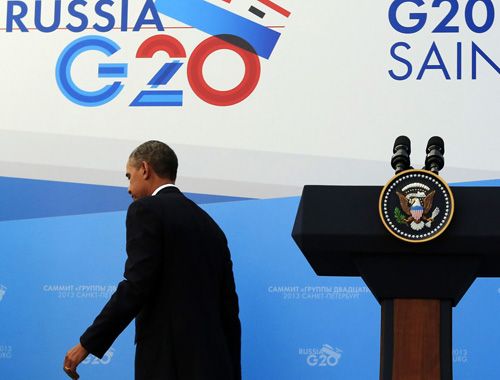Entrepreneurship barometer signals
83 percent of entrepreneurs call on G20 governments to stimulate innovations and economic growth
Entrepreneurs are calling upon Group of Twenty (G20) leaders to foster job creation and economic growth in the world. This call is in the EY (Ernst & Young) “G20 Entrepreneurship Barometer 2013” study. The main reason why this should be done is high unemployment and low economic growth in many countries.
It will be recalled that this study offered a new approach to assessing every country by five criteria: access to funding, entrepreneurship culture, tax and regulation, education and training, and coordinated support. A total of 1,500 leading G20 entrepreneurs were polled and over 40 recommendations were drawn up.
“Despite their differences, there are many common challenges for entrepreneurs and governments across the G20. For most countries the agenda remains closely focused on job creation and the barometer highlights that there are things the public and private sector can do simply by learning from each other. Easier access to funding, simplified regulation and taxes, and bolstered education and training, have already helped to improve the entrepreneurial ecosystem in many countries and governments are already closely connected. But they need to exchange best practices and avoid any pitfalls or unintended consequences that others have already encountered,” says Uschi Schreiber, Ernst and Young’s Global Government and Public Sector Leader.
Across the G20, the best ecosystems for entrepreneurship exist in Australia, Canada, South Korea, the UK, and the US. The US leads the barometer in terms of access to funding and entrepreneurship culture and France is top for education and training.
However, rapid-growth markets are closing the gap and making the fastest improvements to their entrepreneurial environments. Saudi Arabia is perceived to be the most attractive in terms of tax and regulation due to its low corporate tax rates and simplified regulations. Within the final pillar, providing “coordinated support,” including mentoring and peer to peer networks, Russia scores highest, followed by Mexico and Brazil.
Access to funding is cited as the top priority for global action by 70 percent of entrepreneurs, who agree that obtaining finance remains difficult as their businesses grow and develop, and the sources of finance they rely on change. The barometer highlights that governments should create a range of mechanisms and institutions that provide entrepreneurs with capital at every stage of growth, alongside providing support and mentoring, which is essential to enable entrepreneurs to use this capital effectively.
The US ranks highest overall for providing access to funding, followed by UK and China. While in the US only 15 percent of entrepreneurs report that it is very difficult to find funding, in countries such as Italy and Argentina this figure is much higher at 45 percent and 40 percent, respectively. Access to early-stage funding is starting to improve, with the US, Canada, and Australia as well as Saudi Arabia and Indonesia performing well in providing funding for startups. Further innovation is required to broaden the early-stage funding eco-system. This includes large corporate venturing sources of funding to boost their own innovation pipelines while supporting entrepreneurial business.
Companies would also benefit significantly from relief on indirect taxes which often serve as a fixed overhead expense. Eighty-three percent of entrepreneurs agree that an innovation focused tax incentive would improve entrepreneurship in their countries.
“Given the scale of this problem in certain markets in particular governments have to be innovative. Entrepreneurs are looking to their governments to incentivize new sources of funding whether it is unlocking bank lending to entrepreneurs, providing public funds, crowd sourcing or microfinance. Being creative can be a demonstrable success – nearly half of the entrepreneurs who are aware of crowd funding agree that it has improved their country,” says Maria Pinelli, EY’s Global Vice-Chair, Strategic Growth Markets. She notes that, in order for G20 governments to continue to stimulate job creation, there is a need to support entrepreneurship by attracting migrant entrepreneurs as truly global talent base, treating women entrepreneurs as a major market in their own right, and incentivizing young entrepreneurs. “Entrepreneurs have the power to create jobs and drive growth – but first we need to give them the tools and environment that will enable them to succeed,” Pinelli explains.
In Schreiber’s view, “the message is clear – governments, entrepreneurs, and corporations have to work together to spur growth across the G20.” “For governments, there is a clear call to action to both improve financial and regulatory environments to better support entrepreneurship, but also to do more to encourage an entrepreneurial culture. As well as directly boosting access to funding public policy also needs to consider a more long term holistic approach to innovation and enterprise,” the expert emphasizes.
So what measures should Ukraine take to improve its business conditions and buck the negative global trend? The Day put this question to some experts.
COMMENTARIES
“ECONOMIC LAWS SHOULD BE REVISED”
Oleksandr KENDIUKHOV, chairman, All-Ukrainian League of Economists:
 “The state should support the development of business and entrepreneurship. But in what way and in what directions? Ukrainian entrepreneurs often suggest extremely irrational methods and approaches to economic development. They put emphasis on carrying out large-scale high-cost infrastructural projects that are supposed to stimulate economic processes. These measures produce a short-term economic effect but cause considerable harm in the long term, for they warp investment process. Instead of establishing new competitive production facilities, they build infrastructural units that do not promote this country’s competitiveness in the world. This only conserves the problem of the old production base, which in turn leads to Ukraine’s perennial negative trade balance. In my view, to ward off the negative influence of the tendency mentioned in the report, Ukraine should simplify as much as possible the red tape, revise the economic law, as Singapore once did, and simplify the tax system which now robs the entrepreneur of very much time. If you compare annual man-hours with taxation, this will be 46 hours in Singapore and 1,400 in Ukraine! This slows down the production process. Besides, in my view, the state should directly fund the growth of a new production base and cost-effective high-technology facilities. This will revitalize businesses because the main investments in a new production base will be handled – through order placement – by small- and medium-scale businesses. Therefore, the latter will reap profits and the national economy will have a positive trade balance. The business development situation in Ukraine has in fact remained unchanged in the past few years.”
“The state should support the development of business and entrepreneurship. But in what way and in what directions? Ukrainian entrepreneurs often suggest extremely irrational methods and approaches to economic development. They put emphasis on carrying out large-scale high-cost infrastructural projects that are supposed to stimulate economic processes. These measures produce a short-term economic effect but cause considerable harm in the long term, for they warp investment process. Instead of establishing new competitive production facilities, they build infrastructural units that do not promote this country’s competitiveness in the world. This only conserves the problem of the old production base, which in turn leads to Ukraine’s perennial negative trade balance. In my view, to ward off the negative influence of the tendency mentioned in the report, Ukraine should simplify as much as possible the red tape, revise the economic law, as Singapore once did, and simplify the tax system which now robs the entrepreneur of very much time. If you compare annual man-hours with taxation, this will be 46 hours in Singapore and 1,400 in Ukraine! This slows down the production process. Besides, in my view, the state should directly fund the growth of a new production base and cost-effective high-technology facilities. This will revitalize businesses because the main investments in a new production base will be handled – through order placement – by small- and medium-scale businesses. Therefore, the latter will reap profits and the national economy will have a positive trade balance. The business development situation in Ukraine has in fact remained unchanged in the past few years.”
“SMALL- AND MEDIUM-SCALE BUSINESSES CAN CREATE NEW JOBS”
Volodymyr LANOVY, former economics minister of Ukraine:
 “It is quite clear why foreigners are worried: the global financial system is unstable. The term of various guarantees and loans has also been reduced. This complicates things in business. This raises the necessity of state-sponsored innovations. In fact it is a call to make riskier investments in business startups. Ukraine has to compete in these conditions. But how? No innovations – no desire to support them. No capital owners invest their money in Ukraine’s economic sectors, for they are still to be modernized and many of them put out raw materials rather than high-profit added-value products. How can we get rid of this? The state should give business more freedom, while small- and medium-scale businesses can create new jobs. And this requires incentives, encouragements, and state-budget-based support for privileged bank crediting. It would also be a good idea to boost innovation stimulation funds. Finally, we should revise the structure of budgetary expenditures. At present, though, the state often finances loss-making businesses. It is an anachronism which is banned in the EU. So Ukraine should change the structure of budgetary financial flows. Although official statistics say the number of the unemployed is not increasing, it is no occasion for joy. They either go abroad or stay at home, waiting for better times, while the number of newly-created jobs is falling rather than rising.”
“It is quite clear why foreigners are worried: the global financial system is unstable. The term of various guarantees and loans has also been reduced. This complicates things in business. This raises the necessity of state-sponsored innovations. In fact it is a call to make riskier investments in business startups. Ukraine has to compete in these conditions. But how? No innovations – no desire to support them. No capital owners invest their money in Ukraine’s economic sectors, for they are still to be modernized and many of them put out raw materials rather than high-profit added-value products. How can we get rid of this? The state should give business more freedom, while small- and medium-scale businesses can create new jobs. And this requires incentives, encouragements, and state-budget-based support for privileged bank crediting. It would also be a good idea to boost innovation stimulation funds. Finally, we should revise the structure of budgetary expenditures. At present, though, the state often finances loss-making businesses. It is an anachronism which is banned in the EU. So Ukraine should change the structure of budgetary financial flows. Although official statistics say the number of the unemployed is not increasing, it is no occasion for joy. They either go abroad or stay at home, waiting for better times, while the number of newly-created jobs is falling rather than rising.”






